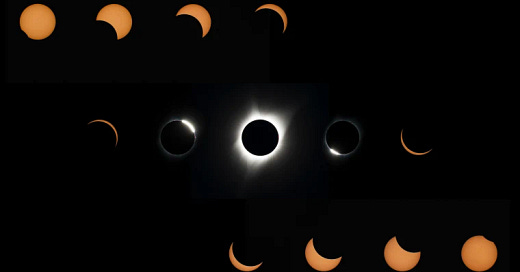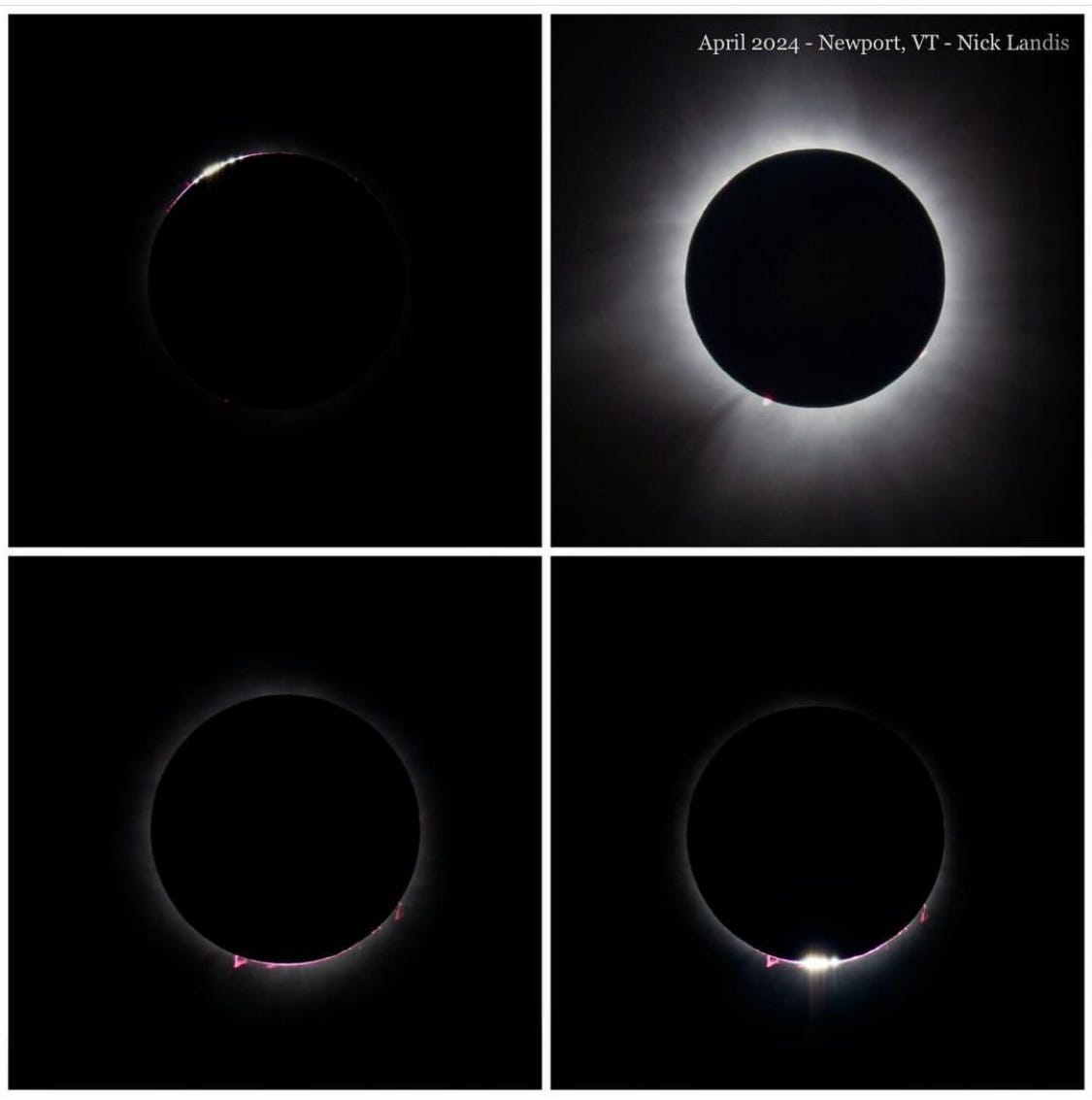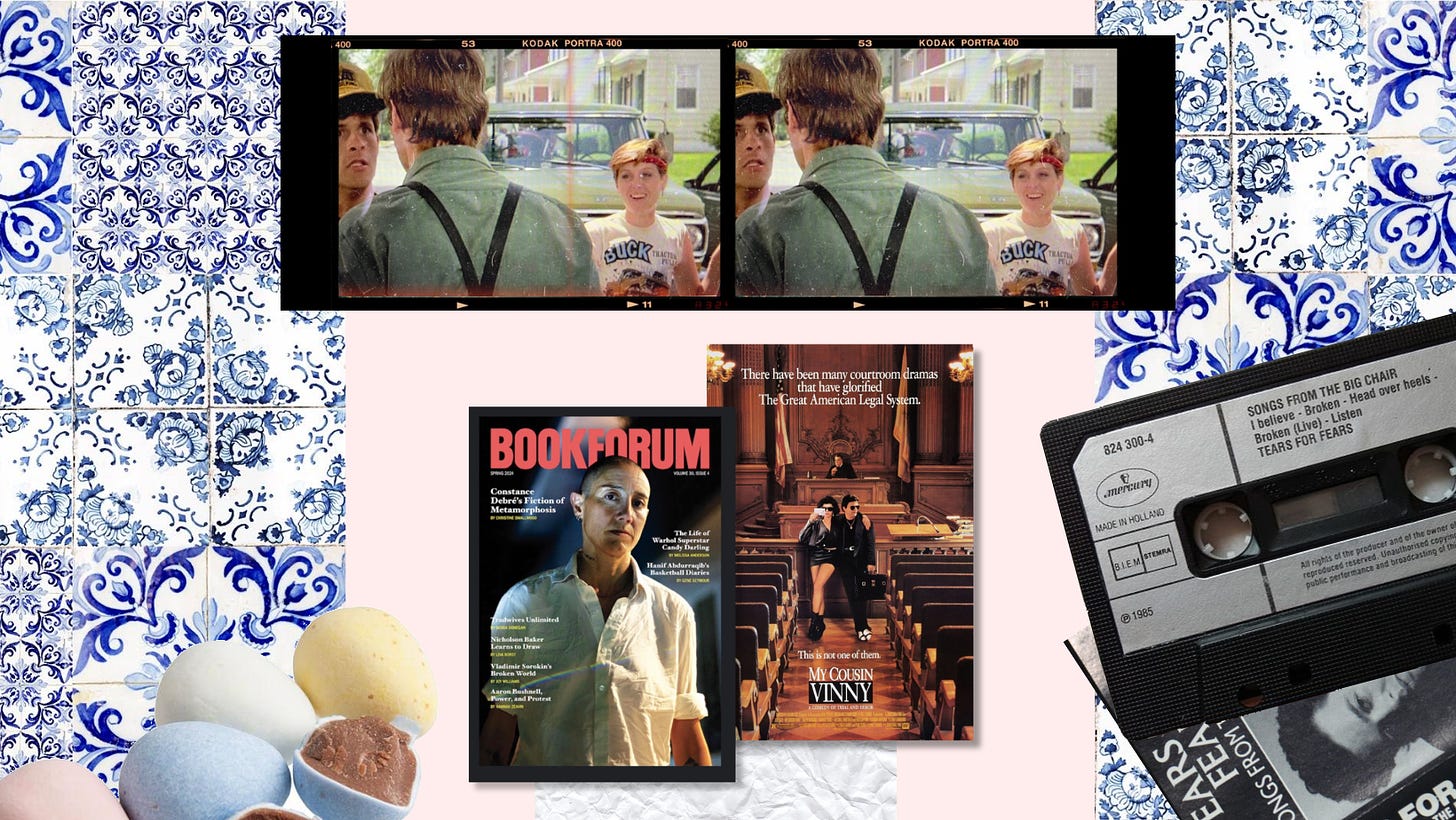Good morning, friends.
Did you see the eclipse on Monday? Here in Baltimore, we got to 88%, and the clouds cooperated long enough to actually see it. It was pretty neat, and I’m glad I got glasses so we could peak out at it throughout the afternoon. The actual experience of seeing the eclipse itself was fine, but what really moved me was seeing the amount of people enjoying the same thing at the same time. And not just anything, but a relatively plain or simple pleasure: holding some dark paper up in front of your eyes, looking at the sun, and going that’s so cool. As the moon approached the peak I went up to a terrace on the roof of my work and watched with maybe twenty or so of my colleagues, some of whom had to hastily rotate in and out to maintain coverage of their posts and give others a turn. From the terrace I could see the sun, yes, but also a dozen people on the balcony of the high-rise offices next-door, and another dozen or so old folks in wheelchairs or sitting on walkers on the sidewalk in front of the nearby senior home, and yet another four or five employees of the hotel across the street looking up from the front stoop, and people on sidewalks and porches sharing and passing glasses back and forth to one another. On the terrace, people narrated the intermittent cloud cover: it’s away, and then triumphantly, it’s back!
I’ve never seen a total eclipse. (The main thing stopping me is a combination of cheapness and hatred of traffic but I feel a little ashamed of this.) My youngest brother, whose photos from Monday are above (a quick unedited dispatch from the road, he would probably like me to point out, though I think they look plenty neat) is an eclipse enthusiast, who has travelled to totality several times. I imagine the sense of community I got in downtown Baltimore, watching people at windows and on sidewalks share an experience together, is amplified a hundred-fold. I’m not here to write about how the unifying experience of looking at the sun is going to fix American politics or anything so inane, but it made me feel glad. I like to find pleasure in natural things, inevitable things, harmless things; I like being around people who experience enjoyment fully, without irony or shame. So often so much joy (including my own; we’ll get to that momentarily), particularly collective joy, is found at someone or something’s expense, perhaps because it’s easy. Enjoying something so big and so small at the same time (literally astronomical but also kind of just looking up) that doesn’t harm anything except a lil productivity is a thing worth noticing.
This feeling was still lingering on Tuesday (I walked to a work offsite near the harbor and saw a Mallard family with nine teeny-tiny ducklings! what a beautiful world!1) when the internet started chattering about a new book review of Lauren Oyler’s latest essay collection, coupled with a new interview she gave about it. (Full disclosure: I haven’t read the new book and don’t intend to. I did read her 2021 novel.) One of several things that are rankling is her very intentional, self-described “ironic voice,” which she seems to think is some sort of cheeky trick that she uses to pretend to be elite, which tricks the real elites into “embarrassing themselves:”
Literally the headline is “Elitism.” And that’s why I’m going like, “Listen to all this elitist stuff that I do.” And it’s really interesting to see who falls for that, because I thought we knew what trolling was and had sort of moved past this irony vs. sincerity conversation…. There’s this ironic voice that I use sometimes that allows me to say, “Isn’t it funny I went to an Ivy League school?” And I think that’s disarming, because you’re not actually supposed to say that, right?2
I too thought that we had moved past the irony vs. sincerity conversation3, but perhaps naively thought that meant we had sort of broadly realized that irony isn’t very much fun, at least not as a consistent practice or worldview? Are those inches or pages of your book, something that I assume took you at least some effort to write and promote, worth spending on the smug pleasure of, what, tweeting later that the people who took you seriously were stupid? (Particularly in the example above, in which the author is saying something factually true, and not especially disarming because people do brag about going to Ivy Leagues in exactly this manner sincerely, so where does the irony come in? My understanding is that on a basic level irony needs to include duality and disparity, some sort of gap between what is said or being engaged with and what is true or being communicated.)
I spend plenty of time feeling smug pleasure about dumb shit4 so there’s no moral high ground here for me; being an occasional hater is one of life’s little pleasures. I’m just curious about the psychology of a person who purports to be amused by trolling, that can’t see a way to being subversive without participating in the same dick-measuring as everyone else. Would it still be fun for you if it wasn’t perpetuating something you’re actually proud of? If the thing (whatever it is— classism? Marvel Movies?) is worthy of critique, isn’t it worth the time for the actual critique? The impulse comes across as lazy at best and malevolent at worst. If it isn’t worth the effort of real criticism, then maybe your one wild & precious life would be better spent looking up at the sun through a pair of cardboard glasses? Eating a peach? I don’t have time to reread Kierkegaard before this newsletter sends tomorrow but I’m also not the preeminent critic of my generation, so forgive me for over-simplifying.
If the thing (whatever it is— classism? Marvel Movies?) is worthy of critique, isn’t it worth the time for the actual critique? The impulse reads lazy at best and malevolent at worst.
To be clear, I’m not trying to undercut the significance of dramatic irony in fiction (or art in general); it’s a storytelling tale as old as time and as more or less successful than any other tool of language. My gripe is with irony and disaffection in criticism, a form of writing explicitly designed to express an opinion (or at least do work related to expressing an opinion, like putting work in context), and maybe with novelists who for some reason think being a novelist is more “fake and embarrassing” than, say, autofiction, a famously cringe-free genre5. Even Socratic irony is discursive, its value in relation to a necessary questioner or subject, whose incorrect beliefs become a rhetorical tool. I’m not going to say it’s impossible to do in an essay, but it’s not what’s happening here.
If I had to guess, I think the over-reliance on an ironic tone comes from insecurity, a need to cloak real feelings behind a veil of just-kidding-or-was-I-really insincerity. I empathize with this if true, partly because I’m very insecure and partly because there are a lot of things in this world I don’t have a solid opinion about, because I know the limits of my own knowledge! Also, sincerity is hard! (So is vulnerability, a thing I hear Oyler attempts a critique of in the book.) By contrast I’m reminded of the newsletter I shared in last week’s email by Caitlin Kunkel, about the endearing part of good musical theater (Ryan Gosling’s “I’m Just Ken” performance, in this example) being the ability or willingness to appear before us and try something with 110% effort and joy that very well might flop! And if it wasn’t that for that risk of vulnerability, if he had appeared under a cloud of cool self-consciousness, it would have been forgettable.
Whether coping mechanism or provocateur flourish, “irony” is no substitute for style, or point of view, or real feeling. At the end of the day I would rather read any critic who can admit what they like or what they don’t like, earnestly and honestly, without the armored window-dressing.
Anyway. That isn’t what I meant to write about this week, but I assure you I mean it.
With love,
C
What I’ve been reading, watching, & otherwise enjoying lately:
Two of my favorite things: artisan craftwork & Portuguese tiles. By Kathleen Beckett, for the New York Times.
Me:
A rewatch of My Cousin Vinny, for the first time in a long time. What can I say! Good movie!
I also rewatched Witness, a movie I’m a little obsessed with, because I got the 4K disc. Good movie! (If you or someone you know has any information on the extra wearing the BUCK TRACTOR PULL t-shirt in the “Strasburg6” fight scene, please contact me! I just wanna know how they got it so right!)
This poem: “Epilogue,” in The Yale Review, by Ricardo Frasso Jaramillo.
Cadbury mini eggs, one of my favorite supermarket chocolates, on steep post-Easter sale
Obligatory, this week, if you haven’t already read: Annie Dillard’s “Total Eclipse.”
“Mirror Mirror,” by Athena Dixon, in The Washington Square Review.
Natasha Lennard, for The Intercept: on how Zionists are “weaponizing safety” on campus to subdue free protest.
https://www.interviewmagazine.com/literature/lauren-oyler-wishes-youd-fact-check-your-reviews
Oyler and I are the same age, which means we lived through the same pro-ironic hipster era and apparently had completely opposite takeaways? Humanity is fascinating.
Including how much I enjoyed all the dumb jokes about that very same review! Some irony is unavoidable!
Filmed that one in Intercourse. Actually, they filmed all the Strasburg scenes in Intercourse, as far as I know. Why even call it Strasburg at that point? I assume Intercourse as a town name was distractingly funny?? I’m hoping this is addressed in the commentaries!!






